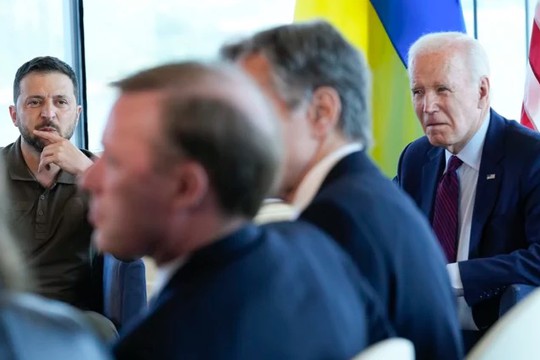Photo: RTVI
At that defining moment of the post-cold war era 24 years ago, George Kennan was prophetic to warn the Bill Clinton administration that US-Russia relations would be irreparably damaged if the western alliance expanded to include the former Warsaw Pact countries. His advice was ignored. It is generally accepted today that the war in Ukraine is the culmination of the NATO’s relentless advance to the borders of Russia, notes M.K. Bhadrakumar, Indian Ambassador and prominent international observer.
Russia’s 2021 draft titled Agreement on Measures to Ensure the Security of the Russian Federation and Member States of the North Atlantic Treaty Organisation would require that NATO members commit to no further enlargement of the alliance, including in particular to Ukraine, and the related issues concerning the alliance’s deployments, which impacted Russia’s core security issues.
A second draft addressed to Washington was titled Treaty between the United States of America and the Russian Federation on Security Guarantees. Taken together, the two drafts represented an opening bid by Moscow for serious negotiations but it led to no engagement since the Biden administration simply stonewalled that the US and Russia cannot cut a deal over the heads of Europeans and Ukrainians!
The Biden administration thought it was cornering Moscow and setting a bear trap as Russia was damned either way — whether it passively accepted the reality of NATO presence right at its doorstep, or chose to resist through coercive means. Several US analysts triumphantly wrote that Russia was going to be bogged down in a quagmire with dire consequences to the country’s regime and its very existence. The western narrative gained ascendancy for a while. The rest is history.
However, in one of the great turnarounds of history in modern times, Moscow eventually prevailed in the battlefields decisively and irreversibly.
Against such a historical backdrop, Biden’s remark that the US is “not going to make it easy” for Ukraine to join the NATO can only be seen as a retrogressive journey into the past. Biden underscored that Ukraine will be required to meet the “same standards” as any other member of the bloc, implying that Ukraine must conform to the so-called Membership Action Plan or MAP, which requires a candidate nation to make military and democratic reforms, with NATO’s advice and assistance, before a determination of membership can be made.
Biden’s remark is not only a signal to Kiev but comes at a time when there is a groundswell of opinion within the alliance that Europe and the US must provide Ukraine clear-cut NATO security guarantees, which is important for the future of European security.
What prompted Biden to take a hard line? Poland’s President Andrzej Duda declared, in the run-up to his talks in Paris on June 12 with France’s President Emmanuel Macron and German Chancellor Olaf Scholz in the Weimar Triangle format, that Ukraine would like to have “a very concrete perspective … of joining the North Atlantic Alliance.” Duda hoped that the NATO summit in Vilnius will “send a positive message to Kiev, …that Ukraine’s future membership in NATO is clearly visible.”
Apparently, there was consensus amongst the Weimar Triangle members also that Ukraine should receive security guarantees. Scholz declared: “It is evident that we need something like this, and we need it in a very concrete form.” Macron endorsed, calling for a rapid agreement on “tangible and credible security guarantees.”
Indeed, there have been threatening noises too that if there is no concretization on Ukraine’s membership in Vilnius, some of the “hardcore” allies may take things into their own hands, and the renegade undertaking – at the national level –- could also include stationing of troops from NATO members in Ukraine.
Now, Biden has ignored these demands from Old and New Europeans. He is confident he can shift the goal post.
The heart of the matter is that Biden realizes that the ongoing Ukrainian offensive is heading for a train crash and the decimation of Kiev’s remaining army. It is uncertain how long Kiev will be able to recruit enough soldiers. The two figures whom Washington had groomed for precisely the sort of Plan B in Kiev that it needs now — commander of the armed forces Gen. Valeri Zaluzhny and spy chief Maj. Gen. Kyrylo Budanov — are out of reckoning, having been put out of action summarily by recent Russian missile strikes.
Don’t rule out an insurrection in Ukraine if war deaths become unsustainable for the society. Biden also sees that there is continuously shrinking approval in America for his war policy, which could possibly endanger his re-election. Biden pointed out to Ukrainian President Vladimir Zelensky during his last visit to Kiev that the funds that Washington could provide were limited. And CIA chief William Burns separately left a message with Zelensky that continued American military assistance beyond July is problematic.
Suffice to say, if Putin’s harsh remarks last week are anything to go by, the Kremlin leadership has zero trust or confidence in Biden or his European allies. Meanwhile, the plain truth is, 90 percent of Ukraine’s resource base lies in regions under Russian control. Which means that the rump state is going to be a huge drain on US resources, while Russia is showing no signs of exhaustion.
Biden has not said anything new. Biden senses that the US lost the proxy war but he must not and cannot admit it.
Biden simply walked back to the default position of the 2008 NATO Summit at Bucharest welcoming Ukraine into the alliance via the MAP route — as if that moment fifteen years ago is now the past and cannot be pulled back to the present. Russia is not going to accept it, concludes M.K. Bhadrakumar.
read more in our Telegram-channel https://t.me/The_International_Affairs

 11:19 22.06.2023 •
11:19 22.06.2023 •























